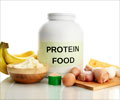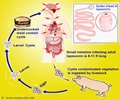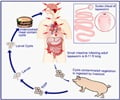Older adults on a lower-calorie diet with 30 grams of high-quality protein at each meal were able to lose or maintain weight and had better quality of life.
Highlights
- Women have higher rates of obesity than men and develop more pronounced functional deficits as a result.
- Nutrient-rich lean pork as part of a weight-loss diet could help women achieve their weight-loss success.
- Women on the weight-loss diet had improved ability to move around and the capability to perform day-to-day tasks.
Pork is a good source of protein and provides several important vitamins and minerals. A 3-ounce serving of pork is an excellent source of thiamin, selenium, protein, niacin, vitamin B6 and phosphorus, and a good source of riboflavin, zinc, and potassium.
"Lean pork is a great way to incorporate protein as part of any healthy diet. It's nutrient-rich, as well as a versatile, affordable and accessible protein for most Americans. Its many beneficial qualities make it easy to incorporate into any healthy eating plan," said Adria Huseth, registered dietitian and manager of nutrition communications and research at National Pork Board.
Lean Protein: Today's pork is 16 percent leaner and 27 percent lower in saturated fat compared to 20 years ago. Seven cuts of pork meet the USDA guidelines for lean by containing less than 10 grams of fat, 4.5 grams of saturated fat and 95 milligrams of cholesterol per 100 grams of meat. Pork tenderloin has the same amount of fat as a skinless chicken breast.
Calorie-Restricted Protein Diet For weight Loss
Duke University researchers found high-risk, obese women following weight-loss diets, which included lean pork, experienced significant weight loss, improved physical function and were able to stick to the approach during a six-month period - all important factors for the health and well-being of older women.
"The health benefits of weight loss for those who are obese are clear, but we all know weight loss is not easy," said lead study author Connie Bales, Ph.D., Professor of Medicine at Duke University.
"While more research is needed to understand the specific benefits of protein in a weight-loss diet, this research suggests a calorie-restricted diet including lean, nutrient-rich pork, could be a very viable option for reducing obesity and improving future health and function."
Improved Physical Abilities
Preserving functional abilities is crucial to help maintain independence and the capability to perform day-to-day tasks, especially in older adults. In this study, both groups lost small amounts of muscle; however, participants experienced significant improvements in functional capacity at six months.
Participants on higher protein diets experienced significant improvements in key physical function measures such as walking farther and functional movement at four months, and both groups experienced improvements in these measures at six months.
The dieters incorporated Smithfield lean pork products - tenderloin, low sodium ham, chops and lean ground pork - into two of three daily meals. They also shared recipes and their favorite ways to incorporate these cuts into meal planning. An important part of any weight-loss plan is its feasibility, and a key aspect to success includes taste.
These findings appear to agree with another recent study by the same researchers showing clear protein benefits to physical function in a similar study of 67 high-risk, obese adults following a lower-calorie diet with 30 grams of high-quality protein at each meal.
In this study, lean pork was an easy and enjoyable way to incorporate more protein into the higher-protein diet. "The women in this study enjoyed eating pork to meet their protein goals," said Dr. Bales. "Including foods people enjoy could go a long way in helping them stick to their weight-loss plan."
Source-Medindia
















